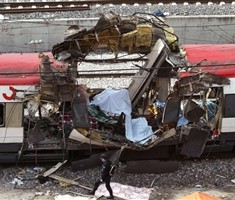"Britons voted on Thursday to leave the European Union. The Leave side led with 17.4 million votes, or 52 percent, versus the Remain side’s 16.1 million, or 48 percent, with a turnout of around 72 percent." From the NY Times, 24 June 2010; see map
Am surprised no mention of Ireland in your article, and the Scots could surely cite that example a bit more forcefully rather than Denmark or Iceland. I wonder why they don't and why you don't. Whatever: Whether independent or not, Scotland and England will continue to get on well; Scotland could flourish under either scenario.
When is the true story about Germany’s role in causing the euro crisis going to be properly told? For instance: Its banks over-lent (often recklessly), feeding the euro bubble over many years and loading countries like Spain and Ireland with private debt. Rather than take a hit from property market meltdowns and the like, Germany has managed to persuade its partners to repay its banks back using tax payers money via sovereigns.
How seriously should you take ratings agencies such as Moody’s and Standard & Poor’s? One answer is “very”, since that is how governments and the media seem to treat them on the whole. Markets will likely react too, though exactly how and when is not as predictable. Broadly speaking, if the agencies downgrade you, media headlines will scream, policymakers could react. If they upgrade you, markets will see you as a safe bet for a big cheap loan.
When the tide goes out, you can see who is not wearing swimming trunks, says Warren Buffett about investors. Likewise, people, and seemingly very clever people, can be found wanting in their efforts to explain the current crisis. They splash about, short of breath and ideas, and tend to resort to clichés and caricature, to reassure themselves they knew it was coming all along, and that proper order is now restored. The case of Ireland shows this up nicely, notably by exposing the prejudice of French political pundit Bernard Guetta.
Here I am back in Iberia. Two years ago we drove through eastern France and down to Valencia along the east coast, via Barcelona. This year we took the western route, via bright Burgos and magnificent Salamanca, then to Merida and into Portugal towards the lovely walled town of Evora, before striking south for Sagres. The last time I did this route was in 1989. How both countries have developed since. More highways, motorways, though luckily not much traffic going into Portugal. In fact, for 20 minutes there was not a car or truck in sight along the hot spanking new asphalt. Sagres is in the south western tip of Portugal, nestling among cliffs that mark the gateway to southern Europe and the lands of the Mediterranean.

Europe's countries should be happy to work together. Not because of globalisation, but because it is better fun that way.

Pilar Cabreza Buria, 37, died in the train bombings in Madrid, 11 March 2004, a Thursday. Her husband, Jesus Antonio Munoz, buried her on Saturday after sitting by her coffin over Friday night. He spoke of his feelings to a BBC reporter. This is an extract: "I started watching television at 0800 in the morning. By 0930 I was completely consumed by the fear that my wife had died.